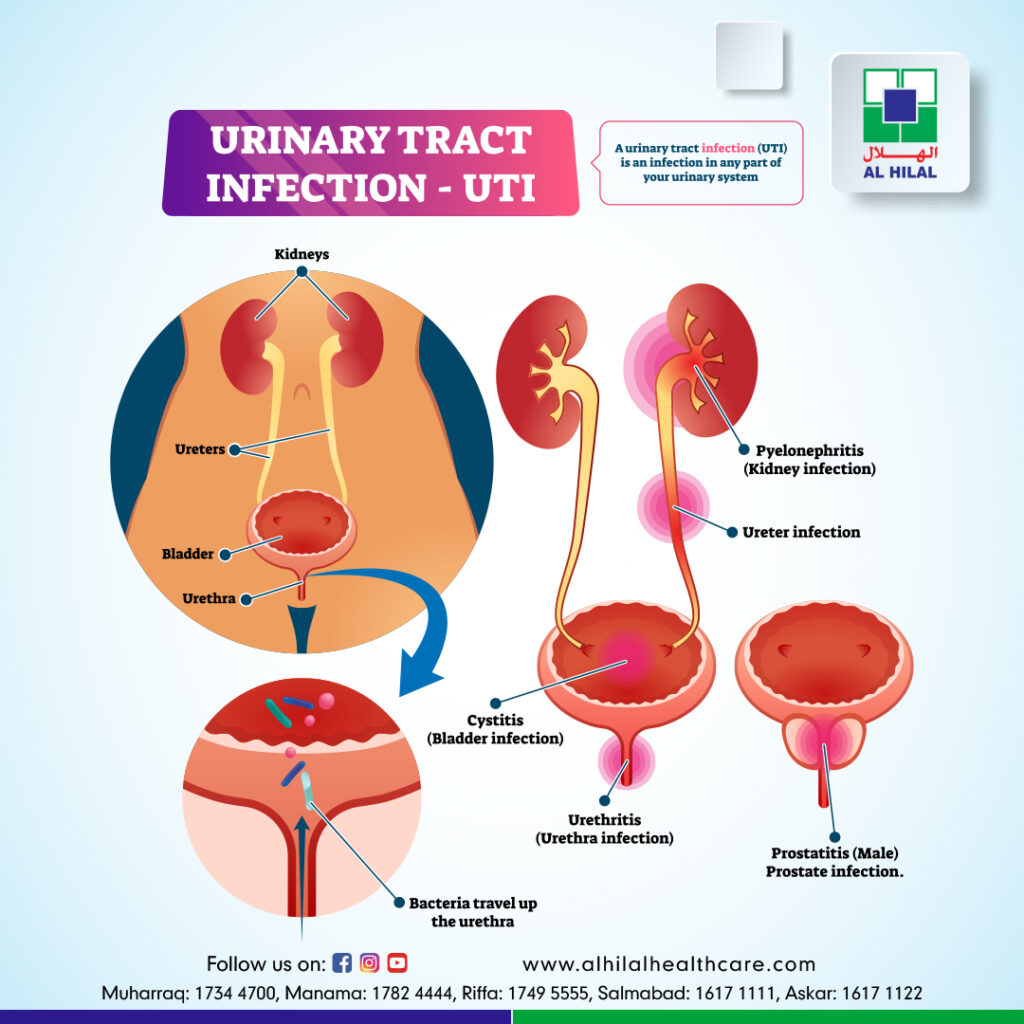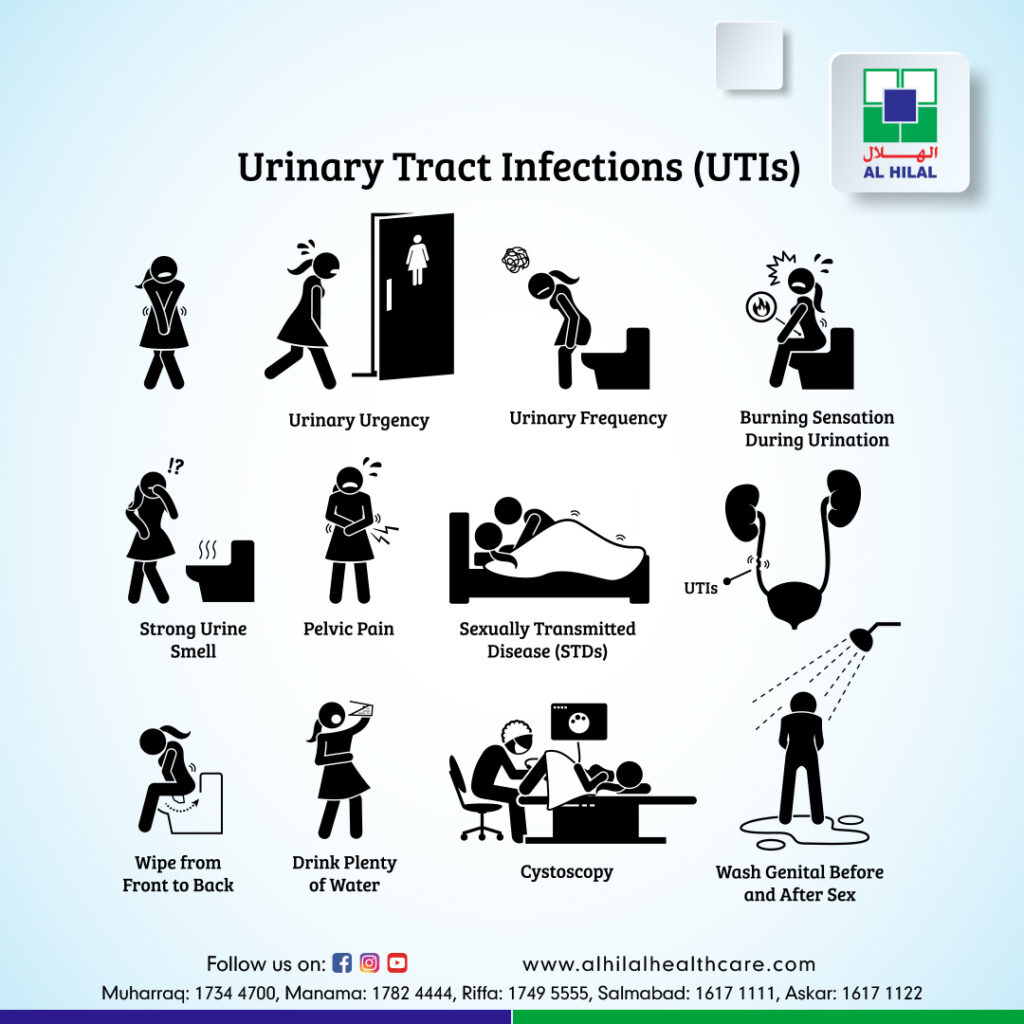What Is A Urinary Tract Infection (UTI)?

A urinary tract infection or UTI is a collective term that involves the infection of any part of the urinary tract. The urinary tract comprises kidneys, ureters, bladder, and urethra. The most common infection is the infection in the bladder, where the urine is stored. UTIs involve the urethra, bladder, and kidneys.
Risk Factors Of Urinary Tract Infection:
The most common cause of UTIs is bacteria entering the bladder through the urethra. Normal urine has no bacteria in it. Some are genetically predisposed to UTIs, just as some are prone to colds. UTIs in adult males under 50 is low, with women being 30 times more likely than men to develop a UTI. Bladder infection is more common in women because the urethra is short and closer to the vagina and rectum, both being sources of bacteria. Some women develop urinary symptoms after sexual intercourse because bacteria enter the urethra. For example, 8% of pregnant women experience a UTI. During pregnancy, the uterus expands for the growing fetus and puts pressure on the bladder and ureter, increasing the risk of UTI.
After menopause, women are more likely to suffer from bladder infections because low estrogen levels increase vaginal bacteria that often cause UTIs.

Symptoms Of UTI:
Symptoms of UTIs can change depending upon which part of the urinary tract is affected. Although not always present, symptoms and signs of urinary tract infections may include:
- Passing a frequent, small amount of urine
- A strong, persistent urge to urinate
- A burning sensation or pain when passing the urine
- Cloudy Urine
- Blood in the urine
- Strong-smelling urine
- Lower abdomen pain or low back pain in women; rectal pain in men
- Kidney infection often causes high fever, upper back pain, chills, fatigue, nausea, and vomiting
How To Prevent Getting an UTI:
- Drink 6-8 glasses of water daily.
- Try to empty the bladder fully every time.
- Do not try to hold it or resist the urge to urinate.
- Avoid too much alcohol, fizzy drinks, or coffee that can irritate your bladder
- Wear loose-fitting cotton underwear. Avoid Nylon.
- Change sanitary pads frequently.
- Women should wipe with a tissue or a clean cloth from front to back after using the washroom.
- Drink at least one glass of orange, cranberry, or grapefruit juice daily to acidify your urine and kill existing harmful bacteria.
- Urinate before and after sex.
you are at higher risk of UTI If You Have:
- Diabetes
- Constipation
- Dementia
- Kidney stones or any other infection that obstructs or blocks your urinary tract
- A weakened immune system.
Diagnosis And Treatment For UTI:
Diagnosis of UTI is made when symptoms occur with a positive urine test. If positive for infection, a urine test will show white blood cells, red blood cells, bacteria, and nitrites (a chemical produced by bacteria).
An uncomplicated UTI can be treated with a short-term course of antibiotics. However, some may need treatment for several weeks, depending on the severity of the infection or the bacteria causing it.
What To Expect:
While cystitis can be very uncomfortable, it is easy to treat with antibiotics. Some UTIs may need a longer course of antibiotics.
Some UTIs can become serious if left untreated and may lead to a kidney infection which may cause permanent kidney damage.
Most adults and children with a UTI recover well and have no future problems.
Pregnant women with UTIs should see their doctor immediately. UTIs can cause serious complications during pregnancy like a Kidney infection, premature birth, and sepsis if not treated.
How To Ease The Symptoms:
UTIs can be painful, but you can take steps to relieve discomfort until antibiotics treat the condition. Follow these tips:
- Unless there is a medical restriction on fluid intake, drink 6 to 8 cups of fluid, either water or another bland liquid such as milk or weak tea.
- Avoid drinking strong coffee, tea, or alcohol, which can irritate the bladder.
- Use a heating pad. Place a warm heating pad on your abdomen to reduce bladder pressure or discomfort.
Recurrent Uti And Its Prevention:
UTIs often recur, even if they are appropriately treated with antibiotics. Women infected by repeated UTIs may be treated with a low dose of antibiotics daily for couple of months. If symptoms are associated with sexual contact, a single dose of antibiotic may be used immediately afterward to prevent the infection.
Uti Treatment In Bahrain:
Al Hilal Hospital is the largest and fastest-growing chain of private healthcare providers in Bahrain, with five branches. Al Hilal Healthcare Group is committed to providing high-quality healthcare services at an affordable price to the people of Bahrain through a combination of superior medical technology and excellent clinical services. Its vision is to be the largest healthcare service provider in the region by catering to the needy at the most affordable rates.
The Department of Obstetrics and Gynecology has been providing comprehensive healthcare for women. As a result, the healthcare group has successfully treated many UTI patients.
Uti Specialist In Bahrain:
Al Hilal Healthcare group is equipped with several well-qualified and experienced Gynecologists who are specialists in treating UTIs.


